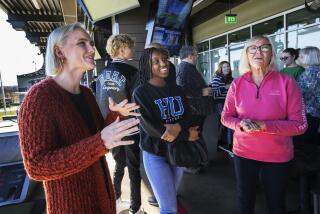CIA Publicly Defends Casey on Contras’ Fund Reports
- Share via
WASHINGTON — In an unusual public statement defending the conduct of its top officers, the CIA confirmed Friday that Director William J. Casey was told last October that money from Iranian arms sales might have been diverted to Nicaraguan rebels--but the agency said he considered the report nothing more than “tenuous speculation.”
“No credible evidence of a diversion of monies ever came to the attention of the agency,” said the CIA statement, read by spokeswoman Sharon Foster. “Most importantly, there is no indication whatsoever that the CIA was involved in any diversion of funds, that CIA misused its funds or violated any law.”
Casey and his deputy took their information to the National Security Council “several times,” the agency said, but Vice Adm. John M. Poindexter, then President Reagan’s national security adviser, apparently did not act on it.
The statement was the first acknowledgement from the agency that Casey, who has been hospitalized since Dec. 15 for brain cancer, heard reports of the possible diversion of funds in October--some six weeks before Atty. Gen. Edwin Meese III discovered the problem.
But the agency insisted, in unusually strong terms, that Casey and his deputy, Robert M. Gates, acted properly.
However, members of both the House and Senate Intelligence committees have said that they still have questions about the nature of Casey’s early knowledge.
Gates is running the CIA as acting director during Casey’s hospitalization, and officials said he approved the release of the agen cy’s statement.
“Inaccurate reports in the media, based on selected leaks, have misrepresented what Director Casey and Deputy Director Gates knew about a possible diversion of Iranian funds to the contras and when they knew it,” the statement said. “It is time for the agency to set the record straight publicly.”
“When Director Casey and Deputy Director Gates were informed in the fall of 1986 of tenuous speculation--repeat, tenuous speculation--that some Iranian monies may have been diverted to the contras, they took appropriate action,” it said. “They reported their concerns to the NSC several times in October, and Director Casey recommended that the White House counsel review the program.”
Recommendation Rejected
Poindexter, however, rejected that recommendation and did not inform White House counsel Peter Wallison about the reports, a senior White House official said Friday.
“Director Casey testified under oath before four congressional committees that he did not learn that monies may have been diverted to the contras until the White House so informed him just before Atty. Gen. Meese held his press conference on Nov. 25,” the CIA statement said. “In their sworn testimony in December, Director Casey and Deputy Director Gates also made a full disclosure to Congress about speculation that had reached them in October concerning a possible diversion of funds and what they had done about that information.”
However, several members of the House and Senate Intelligence committees have said that they were not satisfied with Casey’s testimony in December. A draft report on the Iran arms sales by the staff of the Senate Intelligence Committee completed this week chided Casey for being “less than candid” about his knowledge, a source familiar with the report said.
In public last December, Casey told reporters: “I first learned about this when Meese told everybody,” apparently meaning Nov. 25.
May Have Heard Earlier
But sources familiar with the congressional investigations of the arms deals later said there was evidence--some of it coming from Casey--that the CIA director heard of the diversion of funds much earlier.
The Senate panel’s draft report says that CIA official Charles Allen informed Gates of the possible diversion on Oct. 1, and that Allen and Gates told Casey of it a week later, sources said.
On Oct. 8 or 9, Casey attended a meeting with Lt. Col. Oliver L. North, the NSC aide who handled the arms sales, during which North revealed a financial link to the contras, congressional sources said.
New York businessman Roy M. Furmark has said in interviews that he told Casey in October that money from the arms deals appeared to be missing. Furmark, a business associate of a middleman in the arms deal, said he told Casey at a later meeting on Nov. 24 that the money may have gone to the Nicaraguan rebels.
CIA spokeswoman Foster said she was unable to comment on those reports, or to describe what Casey had considered to be “tenuous speculation.”
The agency normally refuses to make any comment at all on its operations. “We decided to set the record straight this time because there’s a lot of misinformation out there,” Foster said.
More to Read
Sign up for Essential California
The most important California stories and recommendations in your inbox every morning.
You may occasionally receive promotional content from the Los Angeles Times.














